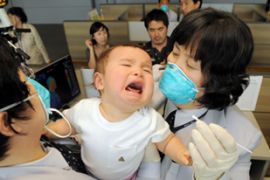WHO rejects swine flu travel bans
UN health body spokesman says border controls and screening “do not work”.

Hartl said infected people may not show symptoms at the airport or when they reach a border crossing, Hartl explained.
Travel limitations such as those imposed during the Severe Acute Respiratory Syndrome (Sars) outbreak in 2003, which killed nearly 800 people, he said, were therefore ineffective.
“Certainly if you feel that you are ill, you should not travel, in any case, to anywhere,” Hartl said.
The health body also said it had confirmed fewer deaths from the new strain of the H1N1 virus than individual countries had.
‘Premature fears’
The US government has declared a public health emergency and is advising against non-essential travel to Mexico where the outbreak started.
| In depth |
|
|
However, Androulla Vassiliou, the European Union’s health chief, said on Tuesday: “I don’t see any point of restricting travelling.”
Vassiliou had said on Monday she was personally in favour of avoiding non-essential travel to affected areas.
The WHO’s assistant general-secretary warned on Monday that the virus would be impossible to contain.
“In this age of global travel where people move around in airplanes so quickly, there is no region to which this virus could not spread,” Keiji Fukuda said, adding that the virus was too “widespread to make containment a feasible” option.
Hartl said the world health body could only confirm that seven of the 20 deaths reported by Mexican authorities were attributed to swine flu.
Besides Mexico, Israel and New Zealand, swine flu cases have also been reported in the US, Canada and Europe.
The US has confirmed 44 cases, with two new cases reported on Tuesday from a school in California, bringing to 13 the number of known cases in the state.
In the UK, authorities said two people in Scotland had tested positive for swine flu infection and were being treated in isolation in a hospital near Glasgow, although both were said to be “recovering well”.
Human-to-human
The WHO also confirmed on Tuesday that transmission of the virus was human-to-human and not from animal or other contact.
| Swine flu: At a glance |
|
|
“There is no danger form eating pork,” Hartl said. “If you cook pork well, if you cook all meat well, it kills all virus.”
The WHO’s emergency committee decided not to meet later on Tuesday to review the pandemic alert level, which was raised on Monday evening to level four from three, on a one-to-six scale.
“If the virus is an efficient virus, if it spreads easily from human to human, it will probably continue to spread,” Hartl said.
“We are still at phase four because we do not have incontrovertible evidence this is an efficient spreader.”
Ban Ki-moon, the UN secretary-general, trying to allay fears of a pandemic on Monday, said: “We don’t know yet which way it will go, but we are concerned that in Mexico most of those who died were young and healthy adults.”
Most of the swine flu fatalities were aged between 20 and 50. A hallmark of past pandemics has been the high rate of fatalities among young adults.
Richard Fielding, a clinical psychologist in public health at the University of Hong Kong told Al Jazeera: “Concern is warranted at this stage but panic is not.
“The media have a role. One sees it [swine flu] described as a ‘deadly influenza epidemic’. I think balanced reporting is important.
Worldwide, seasonal flu kills between 250,000 and 500,000 people in an average year. The new strain is worrying as it spreads rapidly between humans and there is no vaccine for it.


